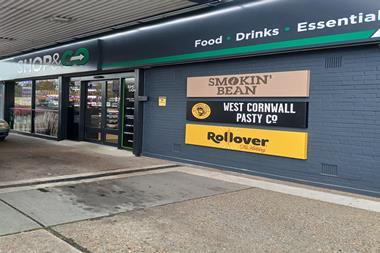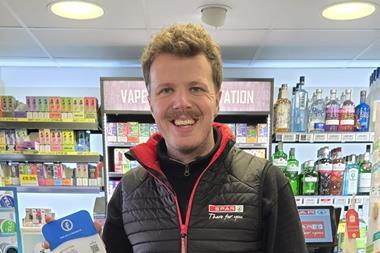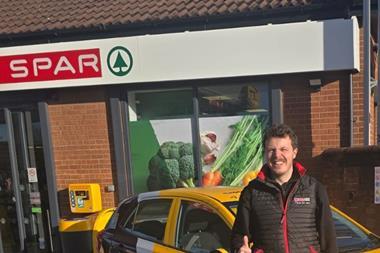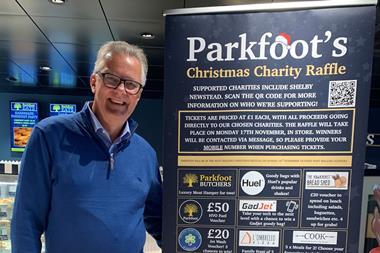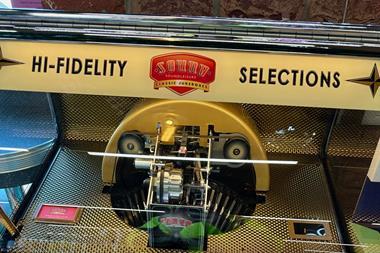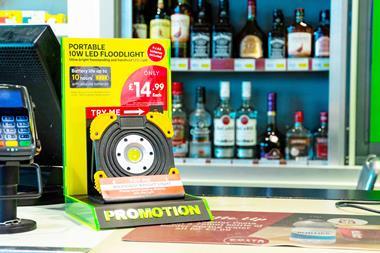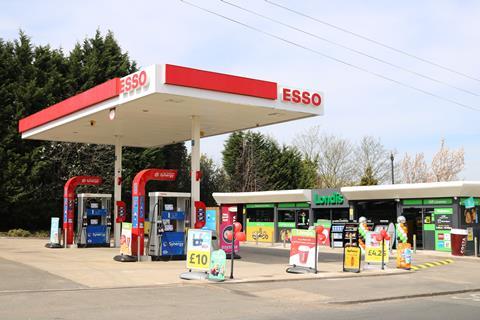
Whether it’s because they want a well-known name above their door or the buying power that comes from that name, or the own label that’s offered or the regular promotions – thousands of forecourt retailers choose to be part of a symbol group.
According to Experian data from last year, it was the Londis name that was most prevalent on forecourt sites, followed by Spar.
Different symbols have different rules and that’s why there needs to be a choice so retailers can choose the one that’s right for them.
Lewis Trevellyan, director at Top 50 Indie Refuel & Go, explains: “Deciding on who we partner with on our shop fascia is one of the biggest strategic decisions we can make as a retailer. It becomes part of the site’s identity for our customers and employees alike. We spoke to a number of brands in 2023 and decided to move all of our eight petrol stations and convenience stores across to Booker Retail Partners and trade under the Londis brand after securing what we believe to be a competitive deal which aligned with our growth plans. We are excited to build on our new relationship with John Ridgley and Mick Hannah at Booker Retail Partners. Their attention to detail, account management and availability on delivery has been excellent thus far.”
Londis has a specifically designed forecourt package which includes bespoke promotions tailored to suit the transient shopper mission and a dedicated Forecourt Team focused on making sure its package is fit for the future and well set to help retailers maximise their sales and profit.
Top 50 Indie NTS has all its stores under the Londis fascia. Director Thaya Nalliah says: “I like Londis because they provide better service and have better availability. Whenever we need help with merchandising, we can always count on the help of a Londis representative. Specifically, when we opened a new store, a Londis representative spent a whole week merchandising the shop and preparing it for the grand opening.”
Londis says that backed by the buying power of a much larger group, it leads the way in delivering lower prices, exclusive products and improved quality to help retailers drive footfall and make more cash profit.
The group focuses heavily on chilled ranges and food to go (especially the eat now mission), and meal solutions. It says it is this focus on areas of growth that has helped it stand out from the competition. This year its focus is on helping Londis retailers make an extra £150k profit.
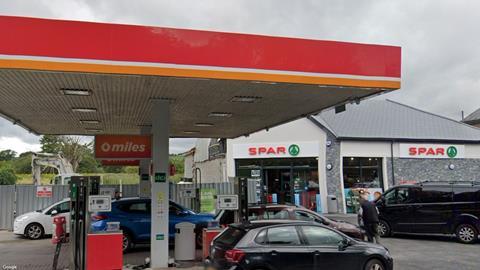
Well-known name
John Tinnelly who owns Ghan Filling Station in Rostrevor, Newry, switched from Mace to Spar back in 2021. He says he chose Spar as there were more of them around and they are more well known.
His site underwent a knockdown rebuild last year and during that process his shop quadrupled in size to 3,500sq ft. John says: “The help we got from Hendersons for the redevelopment was unbelievable; it was brilliant.
“Things are going really well with the bigger Spar store so much so that we hit our year two target in year one.”
John says he likes the Spar own label and also all the promotions especially as he says he earns a bigger percentage on them than he did with Mace.”
Meanwhile, Laurie McKinnon from Station Road Garage, Ilminster, believes Spar is the strongest of all the symbol groups. “The reliability of deliveries is great. The cost of goods is probably dearer than some other groups but we get a discount based on volume so that helps.”
He is also a fan of Spar own label: “Our is a 2,000sq ft store so we have space to stock most of the own label.”
Ian Taylor, Spar UK retail director, reports that the company’s business continues to perform well ahead of the market. “We are weathering tough trading conditions better than other symbol groups and we are in great shape for the future.
“We have had 10 years of consecutive growth. We continue to improve our retail and customer offer; drive basket spend and footfall and improve our promotional programme. We have an unrelenting focus on our shopper needs and reducing costs for our retailers is a priority.
“Collectively, we invested £122m last year into the growth and development of the Spar business, to continue increasing the sales and profitability of existing and new independent convenience and forecourt partners.”
Taylor says some members of Spar have been in the group for generations. “The long-term alliances between retailer, wholesaler and Spar have played a huge part in our success. It is also sustained by the unique network of relationships created among the retailer members themselves.
“Thanks to the Spar Guild system, we are truly accountable to our members. Our democratic Guild system has stood it in good stead ever since it launched in the UK in 1957. The Guild system is not only at the heart of the way Spar is run in the UK, but also central to the global Spar ethos. Spar is run by local retailers who have an innate understanding of the communities in which they operate; Spar stores are part of the community in every sense.”
Taylor says forecourt sites make up a significant portion of Spar’s business. “We have examples of all our formats within our forecourt stores and we will tailor the offer, space and range to that format.
“This means if the Spar store is purely transient, we will set the store up to deliver the Grab and Go, off licence and news and tobacco missions. However, if it is a site which also operates as the village shop, we will modify the range to ensure that the ‘making a meal’ and ‘store cupboard staple’ missions are met.”
Taylor adds that it is important to remember that all forecourt sites have a customer segment that is transient, so retailers need to ensure that they cater for food-to-go in all stores.
He says Spar is providing retailers with improved location analysis through its partnership with Geoblink: “This enables us to make data-driven decisions based on real-time customer data to build a proposition which meets the changing needs of our customers.”
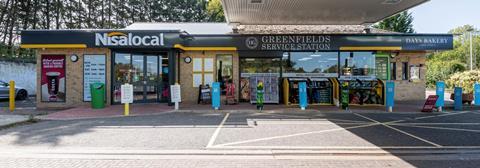
Co-op coup
One of the biggest attractions of Nisa has got to be the access it gives forecourt retailers to more than 2,400 Co-op own label products.
Indeed SG Petch has credited Co-op branded products for its decision to rejoin Nisa after a six-year hiatus.
The North-east based family-owned business, whose core area is in automotive dealerships, had the chance to open a forecourt convenience store at its Haxby site near York and chose Nisa and its Express fascia.
The group’s Express fascia and store format has been created for smaller stores up to 1,000sq ft. It has three sub-formats: forecourt, food-centric, and essentials; each designed to provide a first-class shopping experience and maximise sales in a minimal space.
SG Petch’s 635sq ft store at Haxby was ideal for this. The company’s finance director, Simon Rees, says: “Nisa felt like the most suitable fit for Haxby. Our local customers are typically middle class and there’s a good proportion of retired people. We feel that the Co-op’s brand is good quality and reputable and suits the locality.”
Tom Highland at the Highland Group says he chose Nisa because of its extensive range and because of the Co-op own brand, which he believes to be one of the strongest own brands out there.
Says Tom: “I have been with Nisa for about five years now. We have been Spar and Budgens in the past but I just feel that Nisa are far better prepared to fill larger stores.
“The best thing about Nisa is the Co-op own brand, especially in the chilled sections. Other than perhaps Morrisons Daily, they have the largest chilled catalogue. We did consider Morrisons but thought they were still too new to the independent market and probably wouldn’t allow us the freedom that we currently have with Nisa. We are under contract with Nisa for another two years but I don’t see us changing.”
The flexibility Tom has with Nisa is demonstrated by the fact that at his latest – and largest site – they don’t advertise the fact that they are Nisa as it isn’t the right demographic. “We push our own brand, Highland Group. The customers like the range we offer and that we have the Co-op products.”
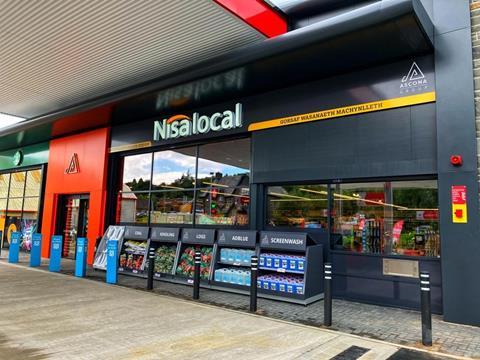
Updated fascias
With Nisa, retailers have the option to use the new updated Nisa fascias - Nisa Local, Nisa Express or Nisa Extra – or their own independent name – like Tom does at one of his sites.
Nisa says it has prioritised adjusting its pricing strategy and last year invested millions of pounds in a range of categories to allow retailers to grow their margins.
Following feedback from retailers, the group made changes to its Fresh Rewards rebate scheme, which now sees the percentage of financial returns previously held within retailers’ store development funds given as a cash rebate.
At the start of 2024, Nisa also implemented a rebate model that is solely calculated on weekly order value. Retailers will also be able to achieve an additional 0.5% rebate bonus if they have a Nisa or co-branded fascia.
Through partnering with Nisa, retailers also get the opportunity to start building a charity fund through Making a Difference Locally – Nisa’s charity initiative. This allows retailers to provide funding for community initiatives through the sale of Co-op own brand products.
Nisa currently supplies 410 forecourt stores and recruited 118 stores in 2023 – which was its strongest year for forecourt recruitment in over five years. Nisa has seen sales from forecourt stores rise by over 35% over five years and currently partners with Top 50 Indies such as Ascona, MPK Garages and Brookfield Retail as well as Forecourt Trader of the Year winner 2023, Tout’s Ltd.
In early 2024, Nisa set out its strategy for the next six years with forecourt retail a key focus area for the business.
“We’re looking to understand the petrol market forecourt market and what consumers are looking for,” says MD Peter Batt.
“Our insight tells us that growth at fuel sites is potentially higher than in a core convenience store, so we really believe that forecourts are a great opportunity for us.
“Consumers will always need to fill up or charge up their car, and we can bolster that with a strong convenience offer and food to go range – which is our second-biggest growth category.”
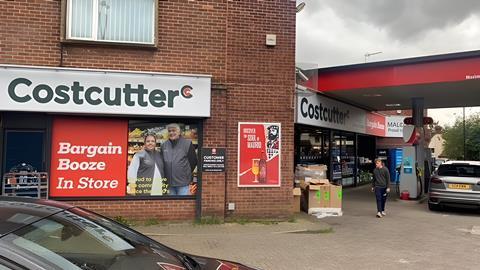
A return to Costcutter
Paul Cheema, director of Malcolm’s Stores’ Texaco forecourt, Tile Hill, and Elm Tree Avenue Stores returned both sites to the Costcutter brand back in October 2022 – and says he was so glad he did. “We wanted to come home to Costcutter for many reasons including the ability to access the wide range of products available via the Bargain Booze, Costcutter, Co-op and Bestway supply chains. Being able to maximise availability allows us to deliver an exceptional offer to our customers while achieving our profitability expectations as a business.
“Support is an essential factor for us as a family within our business, and working with likeminded people that are relationship focused and passionate about supporting independent retailers is exactly what we want, and we believe it’s a core strength of Bestway Retail. It has the best offer in the business.”
Jamie Davison, retail director at Bestway Retail, says that what sets Bestway apart from other wholesalers and suppliers is its everyday low pricing on a 14,000 SKU range, monthly consumer promotions that rival the multiples and its award-winning own-label ranges and Co-op own brand products.
“Bestway encourages entrepreneurs to run their business independently, with the support of a personal business development manager, meaning they have more flexibility compared to other symbol agreements,” he explains.
Davison says Bestway is proud to offer one of the most attractive reward programmes in independent retail, where retailers benefit from their overall Bestway Group purchasing.
“Bestway can help retailers build store ranges and offer pos and planograms and a very strong impulse promotional plan, a category which is a key sales driver for forecourt stores.”
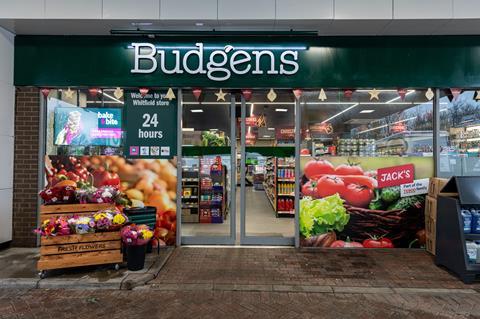
Fresh support
Budgens stores are a well-known sight on forecourts. Known for its quality, fresh produce the brand has developed its offer to cater for growing demand for food to go, chilled meals and vegetarian and vegan options.
In the food-to-go category, Budgens has expanded its hot ranges and improved its lunchtime offer. It now has over 100 products, including healthier options with half coming in at under 400 calories, and there is a choice of two price points for meal deals. The breakfast range has been improved too and to meet consumer needs in the fast-growing ‘treat’ sector, it has introduced new bakery ranges, iced drinks and a desserts counter.
Budgens has added additional meal solutions, including vegetarian and vegan options to its Discover the Choice range. And it now offers longer shelf lives and smaller pack sizes to help retailers to offer a wider range with a lower risk.
Value is addressed by headlining the monthly promotional activity with five ‘Big deals’, introducing a 52-week programme of frozen and fresh meal deals and by improving the in-store presentation of promotional offers. The group also continues to leverage Tesco Group scale and ranges to offer ‘outstanding’ value in an extremely competitive market.
Its business model includes a 75% purchase requirement giving retailers the freedom to enhance their offer with locally sourced specialist products. It has a rebate scheme of up to 6% with payment at four-weekly intervals to improve cash flow. And it offers up to six day multi-temperature deliveries plus emergency top-ups at local Booker branches.






















